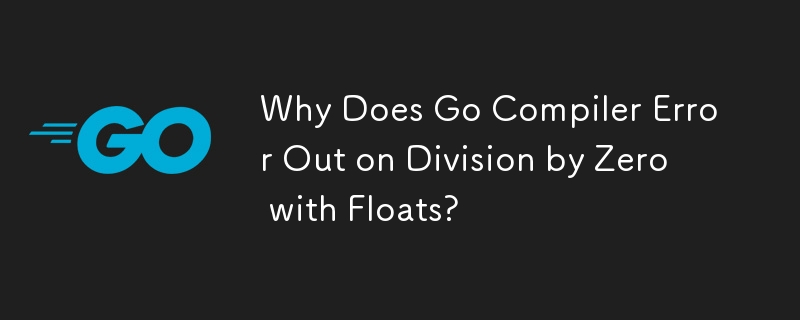

Go Compiler Error: Float Zero Division
In Go, attempting to divide a finite float by zero results in a compilation error. This behavior may seem counterintuitive, especially considering that dividing two finite floating-point numbers usually results in an infinity, as depicted in the following example:
<code class="go">func main() {
var y float64 = 0.0
var x float64 = 4.0 / y
fmt.Println(x)
}</code>Output:
+Inf
However, dividing a finite float by zero triggers a compiler error:
<code class="go">func main() {
var x float64 = 4.0 / 0.0
fmt.Println(x)
}</code>Output:
prog.go:9:22: division by zero
Reason for the Compiler Error
This behavior stems from the unique representation of numeric constants in Go. Unlike most programming languages that directly map numerical constants to IEEE754 float types, Go treats numeric constants as exact values of arbitrary precision. Consequently, Go cannot inherently store infinity or negative zero.
This design choice provides benefits in terms of avoiding overflows in constant calculations, as demonstrated by the following example:
<code class="go">var x float64 = 1e1000 / 1e999 // yes, this is 10</code>
Alternative for Representing Infinity
If you specifically require an infinity value, you can use the math.Inf(1) function to represent positive infinity or math.Inf(-1) for negative infinity.
The above is the detailed content of Why Does Go Compiler Error Out on Division by Zero with Floats?. For more information, please follow other related articles on the PHP Chinese website!
 How to create a web page in python
How to create a web page in python
 What are the Python artificial intelligence frameworks?
What are the Python artificial intelligence frameworks?
 Introduction to parametric modeling software
Introduction to parametric modeling software
 The difference between scratch and python
The difference between scratch and python
 What should I do if the Chinese restart setting of vscode does not take effect?
What should I do if the Chinese restart setting of vscode does not take effect?
 Virtual currency trading platform
Virtual currency trading platform
 How to solve Java stack overflow exception
How to solve Java stack overflow exception
 How to share printer in win10
How to share printer in win10




